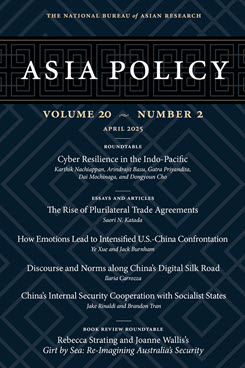Essay in Asia Policy 20.2
China’s Internal Security Cooperation with Socialist States
This essay examines China’s cooperation with ideologically aligned single-party Leninist states, framed within the “community of a shared future for socialist countries.”
Executive Summary
MAIN ARGUMENT
China’s deepening internal security cooperation with single-party Leninist states represents a formidable challenge to Western democracies, underscoring the need for pragmatic approaches to counter its growing influence. Drawing in part on open-source materials from Chinese academics and official policy documents, this analysis argues that China is using its “community of a shared future for socialist countries” framework to consolidate other authoritarian regimes, such as Vietnam, Laos, North Korea, and Cuba, around shared governance models and ideological affinity. This conceptual framework is used internally by Chinese academics and policymakers as a subconcept of the China’s “community of a shared future for mankind.” Through opaque collaboration in areas like cybersecurity and security training, this bloc complicates Indo-Pacific security and critical flashpoints such as the Korean Peninsula and the South China Sea.
POLICY IMPLICATIONS
- If China continues to pose an external threat to these countries as its power grows, then the U.S. could consider offering assistance on internal security, focusing initially on Vietnam, Cambodia, and, to a lesser extent, Laos, where the feasibility of this initiative would align more closely with current regional dynamics. Such assistance could include maritime security, antipiracy efforts, extradition of nonpolitical criminals (where applicable), professional military education, and anti-drug initiatives.
- If China escalates its internal security cooperation by promoting authoritarian practices such as censorship or other repressive tactics, then U.S. policymakers could sanction the Chinese entities and individuals involved, asserting international norms and values while signaling disapproval of such practices.
- If China’s internal security cooperation extends into external security domains, then it is crucial to conduct thorough risk assessments and implement measures in order to safeguard U.S. technology and operational practices from potential Chinese intelligence activities, ensure operational security, and maintain strategic advantages.
- If the U.S. offers development assistance to increase engagement with these countries, then it should also consider employing economic cooperation to gain diplomatic leverage and foster positive relations while promoting democratic values and governance practices.
Jake Rinaldi is a Defense Analyst in the China Landpower Studies Center within the Strategic Studies Institute at the U.S. Army War College (United States). Dr. Rinaldi holds a PhD and MPhil from the University of Cambridge, where he researched China–North Korea military relations and China’s nuclear forces.
Brandon Tran is a Cadet at the U.S. Military Academy at West Point (United States), majoring in international affairs (foreign policy and security studies) and Chinese studies.
About Asia Policy
Asia Policy is a peer-reviewed scholarly journal presenting policy-relevant academic research on the Asia-Pacific that draws clear and concise conclusions useful to today’s policymakers. Asia Policy is published quarterly in January, April, July, and October and accepts submissions on a rolling basis. Learn more


